Women at the Forefront of the Digital Revolution in Africa
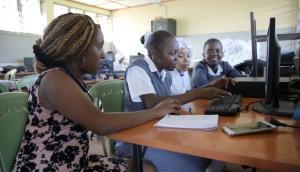
Globally, women in the technology sector are hidden, unrecognized, and often discouraged. Women are less connected digitally and underrepresented in information and communications technology (ICT) fields—and this greatly affects their economic opportunities.
But what would the world look like if female students interested in ICT were supported, mentored, and nurtured? What if these women had the same educational and professional opportunities as men?
Through the Mastercard Foundation Scholars Program, and our partnerships with Digital Opportunity Trust and Skoll World Forum, we have met some young women who are breaking new ground, giving us a glimpse of what the world might look like if women were encouraged to explore the fields of ICT. They have disruptive ideas and are creating meaningful change in people’s lives. They are at the forefront of the digital revolution in Africa.
The Digital Gender Divide
Worldwide, the proportion of women using the Internet is 12 percent lower than that of men. This digital gender divide has been closing in most regions of the world, but surprisingly, it is widening in Africa. As of 2017, the proportion of women using the Internet in Africa is 25 percent lower than that of men, a 5 percent increase since 2013 (Source).
Information and communication technologies are important tools for advancing gender equality, women and girl’s empowerment, and a more equitable and prosperous world. Without access to these technologies, women are at a greater risk of being left behind. Technology has the power to connect young women to employment, financial services and mobile money, business support services, peer groups and networks, education, health services, and more. Becoming technologically skilled and connected can play a major role for young women in finding equal footing in the economy.
Tomorrow’s Innovators, Disruptors, and Job Creators
If we invest in girls and young women so that they can dream, tinker, experiment, and invent, they will become tomorrow’s social innovators, disruptors, and job creators. Here are three stories of young women playing an instrumental role in the transformation of their communities, countries, and the continent at large.
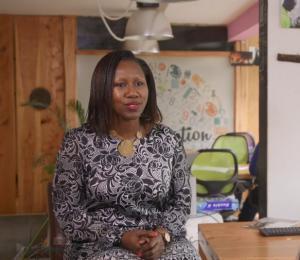
Angela Nzioki, Co-founder and Country Manager, Plus People Kenya:
Angela Nzioki co-founded Plus People Kenya, a tech company that helps small and medium-sized businesses improve their operations. Their products include a cloud-based accounting application called Uhasibu which helps small businesses manage their finances and a human resources management system called Payroll.
“Ten to 15 years from now, I want Plus People to be the business that has solutions all over East Africa. I want to grow with the company. I want to really take on the continent and I want to be the woman that gets it there,” she says.
Angela entered the technology sector “by fluke” when she followed her older sister’s advice to enroll at Strathmore University for a Diploma in Business Information Technology. At the time, it was a new and emerging sector and she couldn’t wait to finish school before getting involved in various projects, developing an e-learning platform for university students and a job-seeking platform for graduates. It was in her third year of studies when she and her co-founder met and started working on Plus People.
Since then, she’s been regularly recognized as a leader and top social entrepreneur: she was a finalist in the Zambezi Prize; one of only 10 participants in the Skoll World Forum Young Leaders Initiative 2016; and is a 2016 Mandela Washington Fellow, Young African Leaders Initiative (YALI).
Angela volunteers at several organizations as a mentor for young women interested in the technology sector. “I am in a group that is called ‘The Women in Tech’ and there are at least 250 of us women leaders active in technology…I feel like we are in the right place at the right time and have been strong enough to get into this sector and wise enough to make sure we are paving the way for women coming after us,” she says.
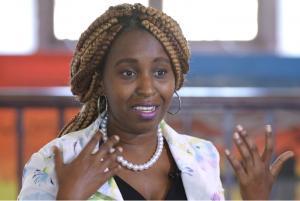
Ruth Kaveke, Co-founder, Pwani Teknowgalz:
Growing up in a rural Kenya, Ruth entered high school without ever interacting with a computer. Nevertheless, she was determined to finish high school with the skills she needed for her future.
“I see technology erupting every day, because there are new solutions being developed in Africa. Everything we will work on in the future will be based in technology,” she explains.
During an internship in her second year of university, Ruth developed a website for the company she was placed with. Her supervisor asked if her male colleagues had helped her.
“I was shocked… and when I went back to school I really felt frustrated,” she says. “If I had these skills, what about other girls?”
After graduating from university she went on to join the ReachUP! Program with Digital Opportunity Trust where she met other like-minded young women who are passionate about encouraging girls to interact with information and communications technology. Together they founded Pwani Teknowgalz, a non-profit organization based in Kenya that provides training to girls and young women in technology-based programs, such as web development and coding.
Ruth and her team at Pwani Teknowgalz have trained more than 800 girls and young women at the high school and university levels. For Ruth, the biggest success is seeing the independence of these young women as they move on and apply technology to solving problems in their communities.
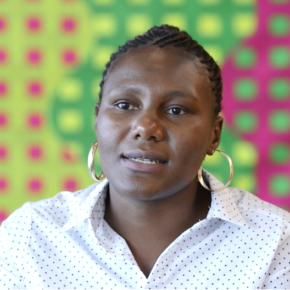
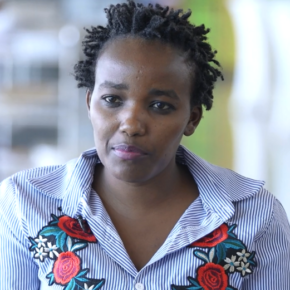
Sylvia Makario and Rahab Wangari, Co-founders, Hepta Analytics.
Sylvia Makario and Rahab Wangari, Co-founders, Hepta Analytics:
Mastercard Foundation Scholars Sylvia Makario and Rahab Wangari co-founded Hepta Analytics, a web-based a platform that provides data analysis for businesses to develop insights for problems in the fields of agriculture, transportation, and human resources.
“We hope to become the unicorn in Africa,” says Sylvia. “We hope to be the start-up that started in the heart of Africa to the rest of the world. Normally we hear stories of other companies coming to Africa – why not from Africa to the rest of the world?”
Originally from Kenya, Sylvia and Rahab recently graduated with Masters degrees in Information Technology at Carnegie Mellon University Africa in Rwanda. Hepta Analytics started as a pet project with five other classmates to collect data and analyze the sentiment of online conversations surrounding the 2017 Kenyan elections. While still in school, they decided to locate their headquarters in Rwanda while opening an office in Kenya once they graduated. The primary goal for Hepta Analytics is to serve the East African market with quality products and data visualization tools.
“We are constantly networking, we are constantly out there. We face rejection” says Rahab, “it doesn’t come easy but I would say we are determined. We are on the right path.”
“You are in a male-dominated field and people look down on you because they think you can’t deliver – this has always been something to navigate through. You have to protect your energy,” adds Sylvia. “Just keep pushing. Keep reaching out to people who can help you, because there are several people who are willing to offer their advice or wisdom. It’s never going to be easy but in the long run, things will work out. For the women in technology, the future is here. Let’s grab it and run with it.”


